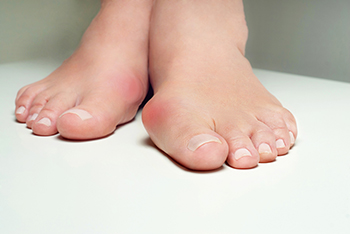
A bunion is easy to notice. The medical term for this condition is referred to as hallux valgus, and is evident by the bony lump that gradually develops on the side of the big toe. It happens from genetic reasons, or from wearing shoes that do not have ample room for the toes to move in freely. This may cause pressure to be exerted on the big toe, which can move toward the other toes, possibly causing them to shift toward each other. Many people develop corns or calluses on top of the toe from having it rub on the top of the shoe, and it can appear unsightly. Having an abnormal foot structure may lead to developing bunions, which is why family members may have them. Patients may choose to wear protective coverings over their bunion, which can shield it from the top of the shoe. If you have developed this ailment, it is suggested that you are under the care of a podiatrist who may recommend surgery for permanent removal.
If you are suffering from bunion pain, contact Dr. Steven Shlonsky of Louisville, Kentucky. Dr. Shlonsky can provide the care you need to keep you pain-free and on your feet.
What Is a Bunion?
Bunions are painful bony bumps that usually develop on the inside of the foot at the joint of the big toe. As the deformity increases over time, it may become painful to walk and wear shoes. Women are more likely to exacerbate existing bunions since they often wear tight, narrow shoes that shift their toes together. Bunion pain can be relieved by wearing wider shoes with enough room for the toes.
Causes
- Genetics – some people inherit feet that are more prone to bunion development
- Inflammatory Conditions - rheumatoid arthritis and polio may cause bunion development
Symptoms
- Redness and inflammation
- Pain and tenderness
- Callus or corns on the bump
- Restricted motion in the big toe
In order to diagnose your bunion, your podiatrist may ask about your medical history, symptoms, and general health. Your doctor might also order an x-ray to take a closer look at your feet. Nonsurgical treatment options include orthotics, padding, icing, changes in footwear, and medication. If nonsurgical treatments don’t alleviate your bunion pain, surgery may be necessary.
If you have any questions, please feel free to contact our office located in Louisville, KY . We offer the newest diagnostic and treatment technologies for all your foot care needs.












